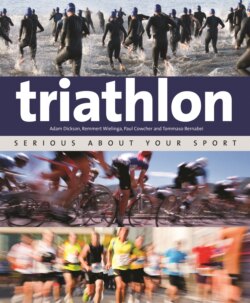Читать книгу The Bonsai Handbook - Adam Dickson - Страница 15
На сайте Литреса книга снята с продажи.
Sleep, food and fluid
ОглавлениеGetting your work-to-rest ratio right is crucial, as an imbalance will lead to over-training, which may result in a decreased performance in training and racing, as well as an increased chance of injury. Put simply: rest is as important as the training itself. As you get fitter you will be able to train longer as long as you keep getting quality rest.
• Set a schedule: be strict in your sleep regime. Sleep and wake at the same time every day including weekends and try to get at least eight hours of rest. Disrupting this schedule may lead to insomnia. ‘Catching up’ by sleeping extra on weekends makes it harder to wake up early on Monday morning because it re-sets your sleep cycles.
• Exercise: daily exercise will help you sleep, although a workout too close to your bedtime may disrupt your sleep. For maximum benefit try to get your exercise about five to six hours before going to bed.
• Avoid caffeine, nicotine, and alcohol. Don’t take these stimulants close to your bedtime. Remember there is caffeine in coffee, chocolate, soft drinks, non-herbal teas, diet drugs and some pain relievers. Don’t smoke a cigarette before going to bed as nicotine goes straight to the sleep centres of your brain and will result in a bad night’s rest. Alcohol can decrease the time required to fall asleep. However, too much alcohol consumed within an hour of bedtime will deprive you of deep sleep and REM sleep (the sleep that rejuvenates your body the best) and it will keep you in the lighter stages of sleep.
• Relax before bed: reading, listening to music, having sex, taking a warm bath, can all make it easier to fall asleep. You can train yourself to associate certain activities with sleep and make them part of your bedtime ritual. If you can’t get to sleep, don’t just lie in bed – relax and do something else (like the previously mentioned activities) until you feel tired.
• Control your room temperature: make sure that you sleep in a room that is cool – 18-19 °C (64-66 °F) with 65 per cent of humidity is ideal – as well as dark and quiet.
So train hard and rest well. Nutrition can help supplement your training by giving you the right balance of energy to train and the proteins, vitamins and minerals to help you recover. If you are not getting the right levels of carbohydrates, proteins, fats and vitamins you will quickly feel tired in training and will fail to recover properly, which can lead to fatigue and maybe illness and injury. Hydration is critical, as the body has to be topped up to perform at its peak. Even a one per cent drop in hydration levels will impair your performance. Get used to taking on fluids.
